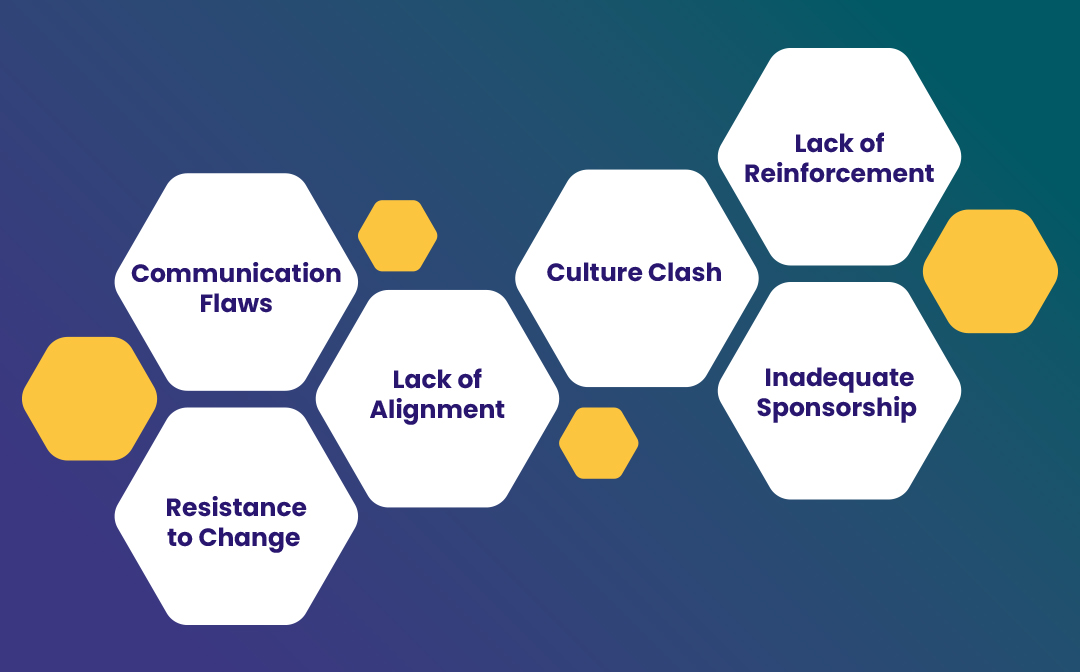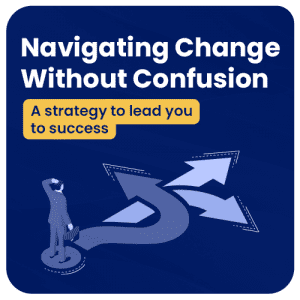
It’s often stated that 70% of change initiatives fall short, with numerous factors contributing to these failures. While change is a constant for most organisations, a robust change management strategy is essential to prepare both leaders and employees for success.Below are six frequent challenges encountered when implementing change, along with strategies to navigate or prevent these issues for a successful outcome.
What Is Change Management and Why Is It Essential?
Change management is a structured framework that supports people through organisational transitions, guiding them effectively through the change process. As business objectives evolve to align with shifting trends, strategic goals must adapt accordingly. A well-executed change management process ensures that your organisation is equipped to embrace new strategies.
Prosci’s research highlights the importance of thorough preparation for both employees and leaders to achieve successful change implementation.
6 Reasons Why Change Management Fails

Implementing change successfully within an organisation requires adherence to several key principles. Here’s what you should avoid and the solutions to overcome these pitfalls.
1. Communication Breakdown
Ineffective communication between leaders and employees can create barriers during change initiatives. When communication is unclear or inconsistent, there’s often a disconnect, leading to confusion about the new direction.
For example, when an IT distribution company introduced robotic automation to reduce manual data entry, poor communication led to employee dissatisfaction. The unclear messaging made employees fear that their jobs were at risk, despite the company’s intention to lighten their workload, not replace them.
Solution:
Effective communication during change management is more than just announcing the change. It involves being transparent about the reasons for the change, its implications, and how it will affect employees. Our Change Management Certification Program equips you with the skills to communicate effectively and guide your organisation through successful transitions.
2. Resistance to Change
Resistance is a natural reaction to change, but if not properly managed, it can derail change initiatives. Resistance often stems from a lack of understanding, comfort with the status quo, or fear of the unknown. It’s crucial to explain the business rationale behind the change and highlight the benefits for employees.
Unaddressed resistance can delay the implementation of change and create ripples of discontent across the organisation.
Solution:
One effective approach to overcoming resistance is to actively listen to the concerns of those who oppose the change. While it may be tempting to ignore dissenting voices, engaging with them can help you address their concerns and provide the necessary information to alleviate fears. The Prosci ADKAR® Model emphasizes the importance of building Awareness and Desire at the outset to foster support for the change.
3. Insufficient Reinforcement
Without reinforcement, employees may revert to old habits, jeopardizing the success of the change initiative. Consistent reinforcement is crucial to embed change into the organisational culture.
Reinforcement ensures that employees remain aligned with the goals and objectives of the change initiative, addressing any uncertainties and solidifying the change.
Solution:
The final stage of the Prosci ADKAR Model focuses on sustaining change through reinforcement. Managers can reinforce change by providing feedback, recognizing efforts, and encouraging behaviours that align with the new direction. It’s also essential to measure performance and establish accountability to ensure the change endures.
4. Ineffective Sponsorship
Sponsors play a critical role in change management by providing resources, support, and setting the tone for the initiative. However, failures can occur when sponsors lack the necessary time, resources, or understanding of the importance of the people aspect of change.
Effective sponsorship has been identified as a key factor in successful change initiatives, according to Prosci’s research.
Solution:
The Prosci ABCs of Sponsorship, based on over 20 years of research, provide a framework for effective sponsorship:
A (Active and visible participation): Sponsors must be actively involved throughout the project to maintain momentum.
B (Build a coalition of sponsorship): The primary sponsor should involve key stakeholders and senior executives to advocate for change.
C (Communicate support): Sponsors should communicate the right messages at the right times to promote the change.
Use the Prosci sponsorship checklist to ensure your sponsors are well-prepared for their role.
5. Misalignment
Research shows a significant gap between leaders’ perceptions of employee involvement in change initiatives and employees’ actual experiences. This misalignment can lead to a lack of trust and lower morale, hindering the adoption of change.
Alignment among project teams, leadership, and management is crucial during the change process to ensure everyone is working toward the same objectives.
Solution:
The Prosci 3-Phase Process offers a structured approach to managing change at scale:
Phase 1 – Prepare Approach: Clearly define the end goal and understand who needs to change their behavior for the initiative to succeed.
Phase 2 – Manage Change: Equip people to navigate the change process, ensuring alignment between leadership, management, and project teams.
Phase 3 – Sustain Outcomes: Focus on long-term results and ensure responsibility for outcomes is clearly defined after the project concludes.
6. Culture Clash
An organisation’s culture plays a pivotal role in its ability to manage change. A culture that struggles with change, due to internal politics or existing silos, can create significant resistance.
Research shows that cultural awareness is critical, with many employees experiencing tension or conflicting priorities during change initiatives.
Solution:
The first step of the Prosci ADKAR Model, Awareness, is crucial for overcoming cultural resistance. By fostering a clear understanding of why change is necessary, employees are more likely to align with the new direction.
Conclusion: Avoiding Change Management Failures
Failures in change management often stem from an overemphasis on the technical aspects of change, while neglecting the people who will be affected by it. The Prosci Methodology addresses both sides, ensuring a balanced approach that strengthens organisations as they navigate change.
As the only Prosci affiliate in India, MARG Business Transformation is uniquely positioned to help your organisation successfully manage change. We offer tailored workshops designed to equip your team with the tools and strategies needed to drive effective change. Join our change management certification workshops to learn how to avoid common change management failures and ensure your change initiatives lead to lasting success.
If you’re interested in learning more, contact us at [email protected].






